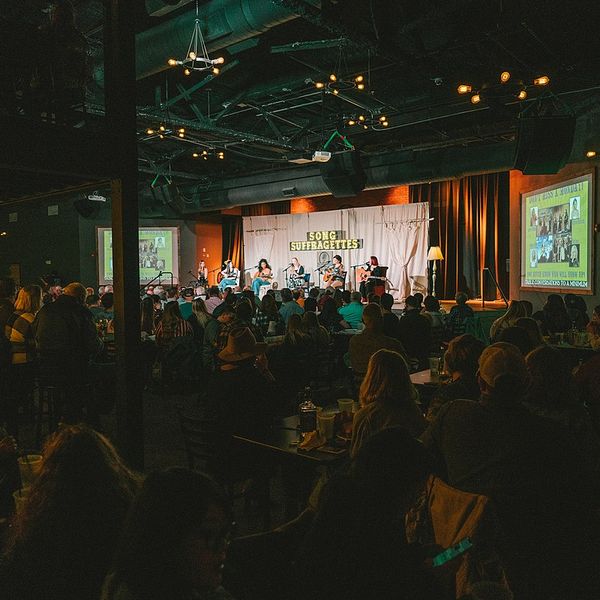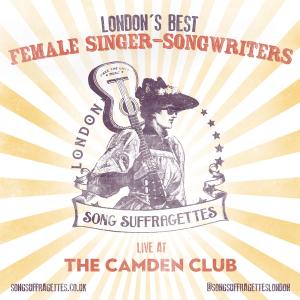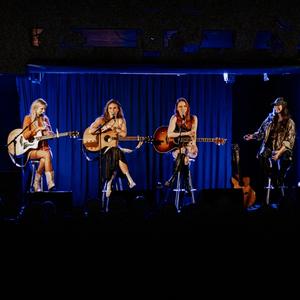




Link copied

In the midst of the ever-depressing status quo of gender bias in country music, we spoke to some considerably more optimistic artists - Nashville’s only female writers’ round, Song Suffragettes. Ahead of their showcase at this year’s C2C Festival, Paris Adams, Alyssa Bonagura and Haley Mae Campbell share their experiences and aspirations, and Song Suffragette founder Todd Cassetty speaks of the industry’s problematic female:male ratio status.
‘Women don’t want to listen to women on the radio’, said no woman ever. In fact, it’s something said by men, who have clearly never actually questioned whether this is the case. Yet it remains a perennial problem for women in country music because someone once peddled this myth, and it stuck. So much so, in fact, that there still exists an unwritten rule not to play female-led tracks back-to-back, and another to not play them very much at all.
Some will remember the tomato-gate incident of 2015 when radio consultant Keith Hill spoke the immortal words, “If you want to make ratings in country radio, take females out.” At the time, female artists made up 19% of radio plays on country stations in the US. But he didn’t stop there, Hill went on to liken women to the “tomatoes of the salad”, insinuating they were to be scarcely included whilst men, the lettuce, were the bulk and base of it all.
And somehow, it gets worse. Since then, the gap has widened even further. Female artists now represent around 10% of country music played on the radio. Those statistics get even scarier when it comes to older female artists. Not only is the music of women in country being restricted on the radio and in the charts, but it’s also got an age limit.
So what is going on? Back in the 90s, it was the women of country that ruled the roost. The charts were awash with hits from The Chicks, LeAnn Rimes and Faith Hill, to name a few. But then the promising upwards trajectory took a turn for the worse.
But so long as there have been barriers, there have been breakers. For every man likening us to vegetables, there’s a thousand women ready to prove that the tomato is the salad.
Todd Cassetty was amongst frustrated listeners who refused to accept there ‘weren't enough’ talented female musicians out there (another theory as to why there were so few women on the radio). So in 2017, Song Suffragettes was born, Nashville’s only all-female writers’ round. A weekly acoustic showcase that features five female singer/songwriters of all genres, Song Suffragettes is putting the spotlight where it needs to be.
Nine years on, the showcase now boasts past alumni such as Carly Pearce, Kelsea Ballerini, Lainey Wilson and TikTok sensation, GAYLE. Since its inception, 30 singers have been offered record deals, and 60 songwriters have received publishing contracts. Song Suffragettes has now also moved across the pond, putting on a monthly writers’ round in Camden, London. But it’s not just the ‘success’ rates that are to be celebrated.
“The greatest outcome of Song Suffragettes has been the community we’ve built, and the positivity around female singer/songwriters. Women have moved here from all over the world” says Todd. “If you think women all sound the same, come to one of our shows. The artists span a wide range of genres, race, experience. That kind of representation is important to us.”
With women making up the majority of radio listeners in the US, and an infinite ocean of talented female artists around the world, the gender disparity in radio plays clearly stems from the gatekeeping that goes on within the industry. The radio stations, record companies and people in positions of power are the ones trying to reduce women performers to tomatoes and limit their numbers. Todd recognises this issue, saying “you have this continual suppression of female voices, and whether it's purposeful or not, it's definitely systemic.”
Further inspection of the wider industry shows this issue doesn’t just lie with the artists. Women are on the fringes of the business across the board: producers, engineers, executives. In 2018, the USC Annenberg Inclusion Initiative conducted a study over a four-year period showing that across 200 top-charting country songs, only 12% were written by women. As is often the issue with underrepresentation, you don’t think you can be it if you can’t see it.
Singer/songwriter Paris Adams, formerly of The Adelaides, recognises this disparity within her own experiences around making music. A UK-based artist, Paris’ stories from across the pond are not much different. “My producer is a woman, and that’s something I love. Whenever I say ‘she did this’, people are always surprised.” Representation on stage and in the studio, both as an audience member and an artist, means a lot to her. “As well as artists, seeing female guitar players and instrumentalists makes me so happy.”
After seeing singer, multi-instrumentalist and Song Suffragette regular Mia Morris perform, Paris reached out to see if she’d play drums for her. “It spurs me on playing with her because she's a woman. I want people to see that you can have female artists working together and it doesn't have to be male dominated. There’s room for everybody.”
A sense of unity is something that Song Suffragettes clearly fosters. Paris mentions its supportive environment and notable lack of competitive atmosphere. It is striking that the common narrative spun about women competing with one another, as per Mr. Tomato’s comments, actually generates precisely the opposite movement. As much as a system may want to pit women against each other, in reality this creates an environment that encourages us to work together.
To overcome such systems in which women are made to compete with one another, is to engender power. This is something also picked up by singer, producer and songwriter Alyssa Bonagura, formerly of The Sisterhood Band. “Women that support each other are able to succeed together, that’s why I love Song Suffragettes. I’m really excited to be sharing the stage with some amazing women. I remember when women dominated country music because my mum was one of them.”
The child of Kathie and Michael Bonagura, lead singer and guitarist of Baillie & The Boys, Bongaura is no stranger to the music industry. She was practically born on a tour bus, or as she puts it, “the baby came out with the single.” An acclaimed artist in her own right, she also spent three years studying music technology and production, where she was the only girl in her class.
Whilst still feeling the strain of being a woman in country music, she’s not one to focus on the negatives; her sights are set much higher. “I have to just keep doing my thing and support other women along the way, and when somebody tells you no, you say: ‘Okay, let me show you how.’”
The problem at hand is of course not exclusive to country music, or the radio. Across the board, we’re seeing a mass underrepresentation of non-male artists by every metric. Last year, just 13% of the UK’s top festivals headliners were female, and Billboard’s 2022 top 100 songs recorded a 3.4% proportion of female producers. And in 2019 American music festival Rock the South put out a headline poster featuring … Not. One. Woman.
One organisation addressing this gender imbalance is the social media account Book More Women. By providing visual representation of what this looks like, they put the situation into perspective with alarming clarity.
Whilst the forces of social media as a means for positive change are in constant debate, one thing that is not up for discussion is the platform it provides independent artists to be able to break onto the scene and bypass the big dogs, leaving judgement to the truest of critics, the listener.
Haley Mae Campbell has experienced such delights herself. Originally from South Carolina but now a Nashville resident, her most organically streamed song ‘Never Been In Love’ reached viral success on TikTok in 2021. The topic is a complicated one, as Song Suffragettes’ UK organiser Phoebe Seston points out. “Whilst social media presence is a really big factor, TikTok doesn’t always translate to radio plays. But then it does to streams, so it's difficult for artists. Ultimately radio is really important in country.”
It seems widely understood that radio commands a particularly important role in country music. It’s what a lot of the die-hard fans are listening to and where they’re getting their music from. But as Haley points out, country radio has always had a little catching up to do. She says the next generation of listeners are turning to social media to find the newer stuff. “I turn the radio off when I hear too many guys in a row.”
Each of these artists recounted the exact same experience when it came to getting a record deal. Despite promising signs and reassuring conversations, when it came down to it they were all met with the same response: “We’d love to sign you, but we already have a woman, or we have too many on our roster”. “So you’re telling me if I was wearing a white t-shirt and a backwards cap I’d be in there?”, asks Haley.
But a turning of the tides seems on the cards. “It feels like there’s a wave coming through the industry that's working towards being a lot more inclusive, not just female artists but all diverse kinds of artists.”
Initiatives are cropping up to start setting standards for gender equity in the industry. As of 2020, American TV network CMT pledged its ‘Equal Play’ commitment, instituting 50/50 play for female artists across their channels. In the UK, The F List is helping solve the problem firsthand, offering a stacked directory of female talent in the music industry, from artists to engineers, producers to publishers, leaving no excuse for gender bias.
A look back to the long legacy of women in country reveals some of the music industry’s most influential artists. Dolly Parton, Patsy Cline, Shania Twain - couldn’t we happily listen to them back-to-back for the rest of our days? Women in the genre have always been the biggest risk-takers. Yes, that’s because they’ve had to be from the start. But it’s also created some of music’s greatest storytellers. As Haley Mae remarks, “we’ve always been a little reckless.”
So where does that leave us? It’s clear the long overdue tides of change are upon us, but the work is far from over. The needle may have moved, but it’s still got a long way to go. The kind of spaces that groups like Song Suffragettes are creating for women is instrumental to this change. It’s not about disregarding other artists, it’s about levelling the playing field. Ultimately, the best songs will always win. But a fair race requires everyone to start from the same line.
---




